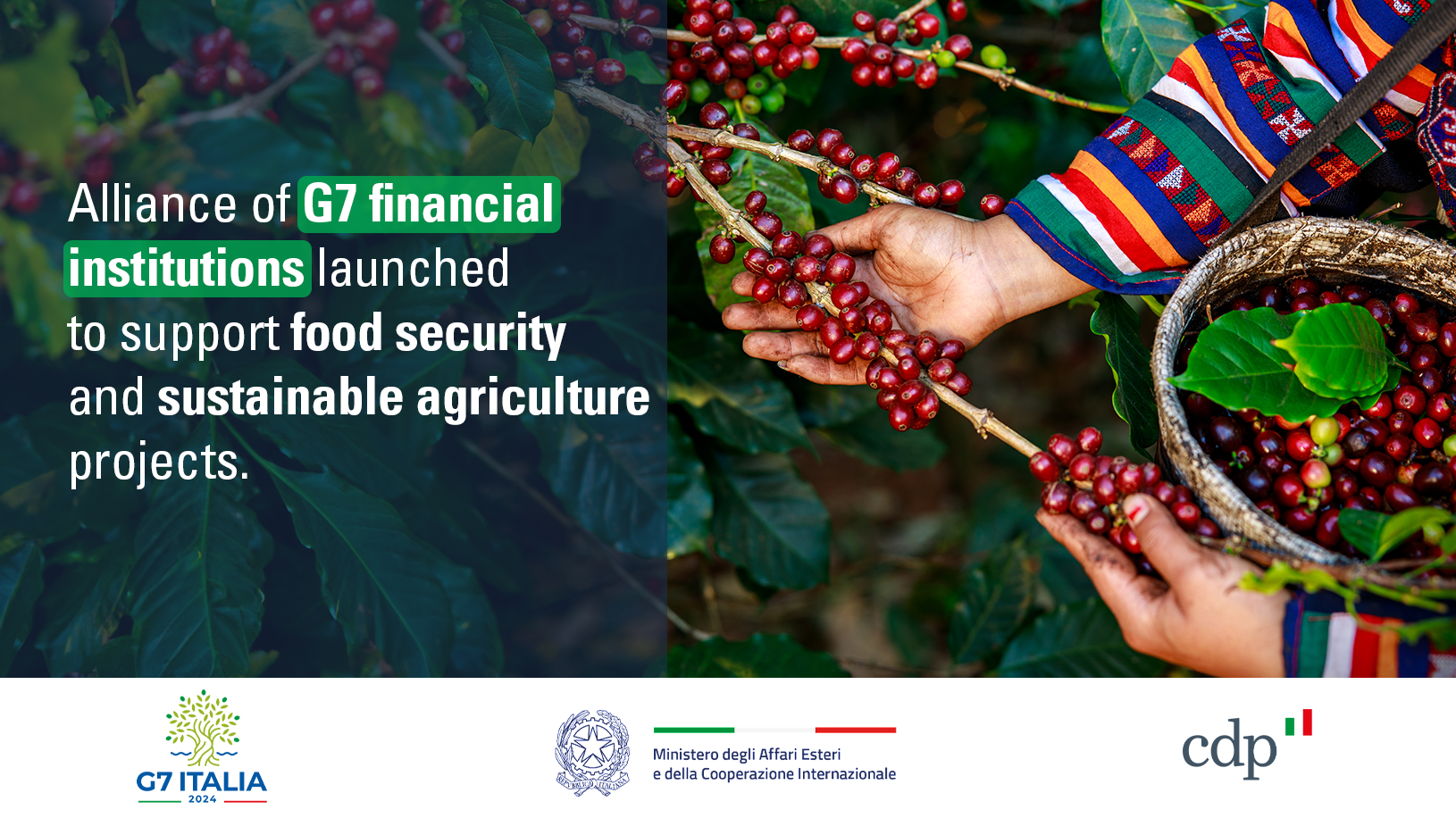The new Collaborative will boost cooperation and investments opportunities in developing countries
Rome, 24 October 2024 – G7 Public Development Banks (PDBs) and Development Financial Institutions (DFIs) are joining forces to enhance food security and sustainable agriculture in emerging markets. Through a new coordination mechanism set up by Italy’s Cassa Depositi e Prestiti (CDP), the Group of Seven PDBs and DFIs are teaming up in the “Collaborative on Sustainable Food Systems”.
The Collaborative will focus on initiatives ranging from climate risk mitigation to environmentally friendly farming and ecosystem services. A prime goal is to strengthen cooperation among G7 PDBs and DFIs and encourage private sector participation in building resilient agrifood systems across the globe. Additionally, within the mandate of each PDB and DFI, the Collaborative will support knowledge and standards sharing on sustainable food systems and develop pipelines of bankable projects, also with the expertise of development agencies and third parties.
The Initiative, announced during the G7 Development Ministerial Meeting in Pescara, Italy, aims to align efforts towards the United Nations Sustainable Development Goal (SDG) of “Zero Hunger”, following the G7 commitment set in the Apulia Food Security Initiative. As climate change and biodiversity loss accelerate, food security has never been more critical. Climate-smart agricultural practices could generate up to $329 billion in annual income for farmers while ensuring sufficient global food production to meet 2050 demands[1], without compromising biodiversity or carbon storage. Yet, current investments in climate-focused agrifood initiatives fall short mainly due to investment risks and the high transaction costs, despite a potential market opportunity worth $4.5 trillion per year by 2030[1].
Participating organisations include: Cassa Depositi e Prestiti (CDP), FinDev Canada, Agence Française de Développement (AFD), Proparco (Groupe AFD), Kreditanstalt für Wiederaufbau (KfW), Japan International Cooperation Agency (JICA), Japan Bank for International Cooperation (JBIC), British International Investment (BII), the United States International Development Finance Corporation (DFC), European Investment Bank (EIB), European Development Finance Institutions (EDFI).
Antonio Tajani, Italian Vice-President of the Council of Ministers and Minister of Foreign Affairs and International Cooperation, on behalf of the Italian G7 Presidency has declared: “We are fully aware of the important role that financial institutions can play to foster development and to make concrete steps towards a more fair and sustainable world. I am very pleased that during the G7 Development Ministers' Meeting in Pescara, Cassa Depositi e Prestiti and the other G7 Public Development Banks and Development Financial Institutions decided to launch the PDB/DFI Collaborative on Sustainable Food Systems, which will represent a key tool to implement the Apulia Food Systems Initiative. This is a very good example of our pragmatic and concrete approach towards development.”
Dario Scannapieco, Chief Executive Officer and General Manager Cassa Depositi e Prestiti has declared: “The G7 PDB/DFI Collaborative on Sustainable Food Systems will foster the development of agri-food projects respectful of the climate-biodiversity-food nexus in middle- and low-income countries. Endorsed by G7 Governments, which have included it in the Apulia Food Security Initiative, the Collaborative will set up a fundamental platform of robust cooperation to advance the achievement of the 2030 UN SDGs. Through this initiative, we’re willing to find new pathways to promote public and private investment opportunities in food security and sustainable food systems in Africa and beyond, and to support the decarbonization of key global value chains in the agri-business sector.”
EIB Vice-President Gelsomina Vigliotti commented: “A rapid transition to sustainable food systems is crucial to not only eradicate poverty and hunger but also create jobs, reduce gender inequality, improve health, tackle climate change and biodiversity loss. Yet, the financing needs to achieve this transition are enormous, estimated at up to $350 billion per year by 2030. The eleven members of the Collaborative will help bridge this gap by pooling resources and experience, working closely together to crowd-in public and private finance.”
Lori Kerr, Chief Executive Officer, FinDev Canada has declared: “Food security and the development of sustainable food systems are critical areas of focus for DFIs. FinDev Canada welcomes this collaborative effort among the G7 DFIs and PDBs to share information and build best practices that will support investments in this space, and which take into account the intersectionality between climate, nature and gender equality.”
Scott Nathan, Chief Executive Officer, U.S. DFC commented: “Investment in food security helps protect the world’s most vulnerable populations. DFC is committed to expanding access to food today and helping to protect against future food crises through mobilizing financing for smallholder farmers, rural communities, and the full agricultural supply chain. DFC welcomes this G7 food security collaborative to support our shared goals around health outcomes and building climate resilient economies”.
Nick O’Donohoe, Chief Executive Officer British International Investment has added: “Bolstering food security in our markets is a core objective for British International Investment. There remains huge untapped potential for many emerging economies across Africa in particular to develop sustainable and thriving agricultural sectors. This not only improves production so that nations are better able to provide for their own citizens, but a robust agricultural sector can also play a key role in supporting economies to become more adaptable and resilient to the impact of the climate emergency.”
***
CDP Media Relations
ufficio.stampa@cdp.it | www.cdp.it
[1] Sutton, William R., Alexander Lotsch, and Ashesh Prasann. 2024. “Recipe for a Livable Planet: Achieving Net Zero Emissions in the Agrifood System.” Agriculture and Food Series. Overview booklet. World Bank, Washington, DC.
